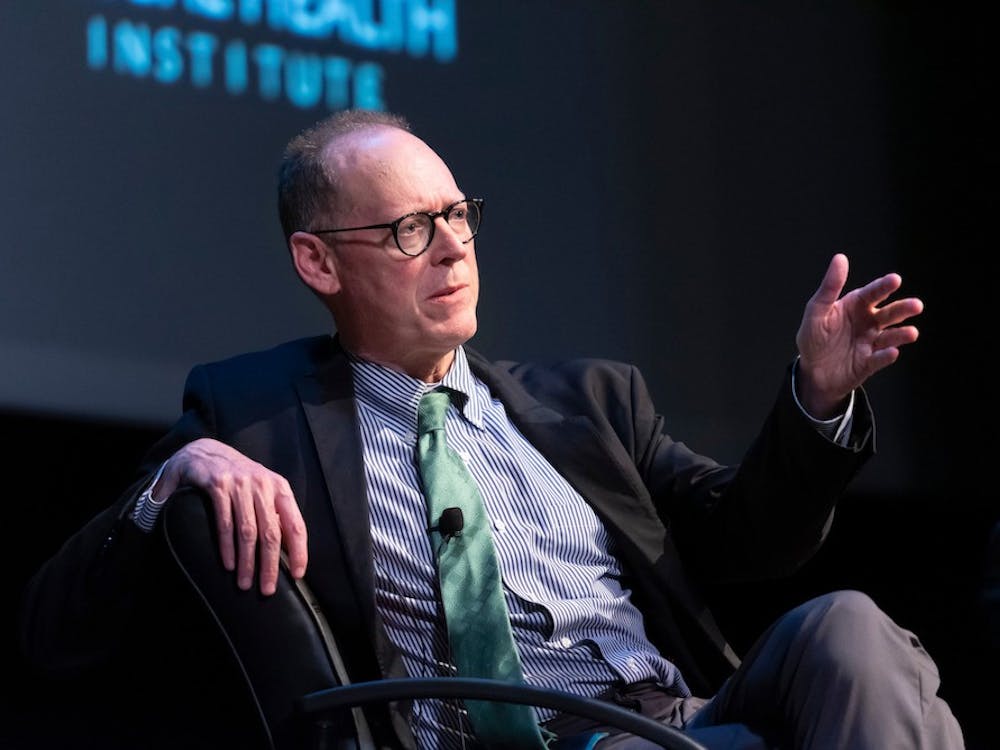I did not plan to read a book about an epidemic during a pandemic. I told myself, just as I told everyone around me, that I was tired of hearing about the current pandemic — let alone any other epidemic. But that all changed very quickly when I traveled through wor(l)ds presented in “Fevers, Feuds and Diamonds,” written by Duke alum Dr. Paul Farmer and published Nov. 17.
In his newest book, Farmer (T '82) tells stories filled with both pleasure and pain that breathe with a sense of proximity so palpable, they make one’s skin crawl. “Fevers, Feuds, and Diamonds” is filled with drops of history surrounding the Ebola epidemic that morph into rivers of revelation which ultimately turn into a reservoir of hope amid the COVID-19 pandemic. Farmer’s newest book is a crucial reminder that history — and life — is a circle and not a line.
“The way I deviated from the conventional public health narrative, I think, was to rebuke myself as the primary protagonist of the public health memoir,” Farmer said in a Zoom interview. “I don’t regard myself as the primary protagonist of any public health struggle — ever. I started learning this at Duke in my medical anthropology courses.”
Just as his own memoir deviates from stereotypical global health narrative, Farmer’s career has also been a deviation from that of a typical physician-scientist. Since graduating from Duke and Harvard Medical School, he has won several awards for his impact as a physician-anthropologist, including the MacArthur Foundation Fellowship. Farmer is also the co-founder of Partners in Health, an international non-profit organization that has provided direct health care services and undertaken research and service activities on behalf of those who are ill and faced with poverty since 1987. He currently serves as the Kolokotrones University Professor and the chair of the Department of Global Health and Social Medicine at Harvard Medical School. Farmer’s humility, compassion and his unconventionality have earned him the description of the “man who could cure the world” in Tracy Kidder's “Mountains Beyond Mountains."
While Farmer’s new novel itself cannot find the world a cure for the current COVID-19 pandemic, it does serve as a soul-strengthener, fostering sensitivity to global health disparities. One of these disparities Farmer explores is the “control over care” ideal which permeated the international community’s response to Ebola in Africa. In other words, the public health community was more focused on controlling the spread of Ebola in Africa than providing the patients who were afflicted with quality care. And while the near opposite has happened for COVID-19 (the spread was promoted by a lack of control early on), the current pandemic has revealed that health disparities are a living, breathing reality. In many ways, health disparities exacerbated by COVID-19 have “shriveled trust to the size of a sour lemon” as Farmer enunciates in his newest novel.
“There’s a lot of reasons to be worried about trust shriveling, but I think we can rebuild trust in this country,” Farmer said. “I have been an infectious disease doctor for all of my adult professional life, but this is the first time I have seen [health disparities] so broadly discussed in the United States”.
But perhaps what makes Farmer’s novel such a masterpiece is his willingness to not only be a voice for the vulnerable but also elevate the voices of the vulnerable themselves. Farmer does not just stop with the shared chronology between the Western World and Africa but drives home the unshared histories. The sincerity with which he gives life to the real, raw, beating heart of humans behind Ibrahim and Yabom, two West Africans, evokes empathy at its deepest. Through the voices of Ibrahim and Yabom, Farmer makes every effort to distinguish colonial fact from “colonial fiction” as he strives to elucidate where and how international agencies fell short in tackling Ebola. But of course, he doesn’t stop there. Farmer goes on to expose the ugly truths of colonialism that sunk their claws into the countries of Sierra Leone and Liberia, very much setting the stage for Ebola’s catastrophic destruction.
“When I was a graduate student in anthropology, the language term was ‘scholarly language’ — English, German, French, Spanish, Portuguese,” Farmer said. “I would now call those colonial languages, not scholarly languages, and assume that anyone, regardless of their language, could be a scholar. But I didn’t know that then.”
Signing up for Medical Anthropology during his junior year at Duke incited the unconventionality in Farmer’s career, the same unconventionality that reverberates in the novel he has written. As he continued through his Blue Devil journey, Farmer changed his major from Biochemistry to Medical Anthropology during his senior year and completed a research project on how Jim Crow influenced access to emergency medical services. Farmer, in his own words, was “waking up” to his calling. And now, by writing a novel about an epidemic that could inform how we understand today’s pandemic in the most critical time, he has woken me up in more ways than one.
Because of Dr. Farmer, I understand that medicine is not a discipline but rather a vocation that builds discipline but also so many other bright, beautiful values like compassion, empathy, sacrifice and humility. Because of Dr. Farmer, I understand that who gets sick is rarely dictated by biology alone. And because of Dr. Farmer, the world today — despite all its darkness and uncertainty and terror — is a brighter, more optimistically authentic place.
Get The Chronicle straight to your inbox
Signup for our weekly newsletter. Cancel at any time.

